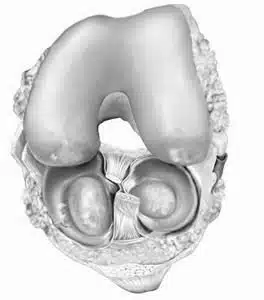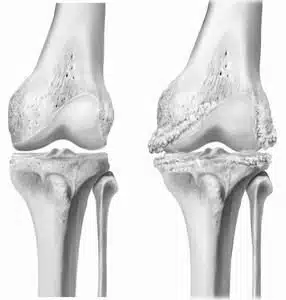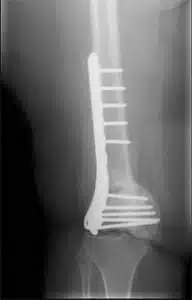Knee Arthritis

The articular cartilage is a coating of smooth, soft cartilage about 1/8th inch thick covering the ends of the femur (thighbone) and tibia (shinbone) and the underside of the patella (kneecap). It can wear away with time or injuries, and after skeletal maturity it does not grow back.
There definitely appears to be a genetic predisposition to developing osteoarthritis.

As the cartilage covering begins to wear away, underlying bone surfaces are eventually exposed (hence the common term "bone-on-bone" arthritis). As the process continues, the body responds by making osteophytes (large spurs) around the peripheral edges of the joint and often by making more joint fluid.
This can result in a buildup of joint fluid, or "water on the knee," which sometimes needs to be drained. The knee usually becomes progressively stiffer as the process continues, and frequently an angular deformity may develop as one side wears out faster than the other. This commonly results in a "bow-legged" or a "knock-kneed" deformity. A flexion contracture may eventually develop in which the knee no longer can fully straighten out.
Trauma and Post-Traumatic Arthritis

Post-traumatic arthritis is also common with any fractures that occur in or close to the knee joint, such as a tibial plateau fracture, which involves the weight-bearing surface of the tibia. After healing, the smooth surface of the joint becomes disrupted, and over time arthritis results.
For many years, the standard treatment for meniscal tears involved removing the entire meniscus from the affected side of the knee (complete meniscectomy). However, it turns out that the meniscus serves an important function as a stabilizer for the knee, and without it most people develop severe arthritis in the knee over the years after excision.
After the development of arthroscopic surgery, complete meniscectomies became rare, and most surgeons treat nonhealing meniscal tears with arthroscopic surgery in which only the torn portion of the meniscus is removed or repaired, if possible. However, it is common to see patients who had complete meniscectomies years ago who now require partial or total knee replacement.
If you have osteoarthritis of the knee that is interfering with your life, contact Orthopaedics New England for a consultation with one of our knee replacement surgeons in Middlebury, New Milford, and Farmington, Connecticut. They will recommend the optimal treatment for you and guide you in your decision-making process. Call (203) 598-0700 today or you can request an appointment online.




